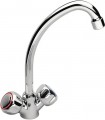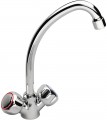Jet depth
Distance from the fixing point (for vertically mounted taps) or from the centre of the mounting hole (for horizontally mounted taps) to the middle of the spout. It is a characteristic that determines the "reach zone" of the tap.
Jet height
The jet height is usually specified for taps with horizontal installation (see "Type of installation"). It is measured from the base of the tap to the spout outlet. The large height of the spout is important primarily for kitchen models (see "Suitable for"), because it allows you to place large dishes in the sink. This parameter is directly related to the height of the spout (see above): the height of the jet cannot be greater than the height of the spout. Thus, in fact, one has to find a compromise between the height of the jet and the dimensions of the tap, especially if there is little space for its installation.
Stop valve
Material and design features of the valve (valves) responsible for opening and closing water in the tap.
—
Rubber. Valve material for low-cost one- and two-valve mixers (see “Product type”). Rubber is inexpensive, easy to replace, and resistant to contaminated water (unlike ceramics). On the other hand, rubber valves have a relatively short service life — when they wear out, they begin to leak, and they have to be changed time to time.
—
Ceramic. These valves are based on a pair of ceramic-metal plates polished for maximum contact and tightness. They can be used both in cross-handle and lever taps (see "Product type"). This material is much more durable than rubber, and in the case of a single-lever tap, it also makes adjustment easier, because the friction between the plates is low, and it is much easier to move the lever than with a ball valve. The disadvantage of ceramics is the sensitivity to water contamination by solid particles — getting between the plates, they can break the tightness of the valve. Therefore, it is recommended to install filters in front of such taps.
—
Electromagnetic. A type of valve used in all non-contact mixers (see "Product type"), as well as some models of a different design — in particular, push-button and single-lever with touch. As the name implies, an electromagnet is responsible for opening and closing water i
...n such models. At the same time, the valve in most models has only two positions — “open” and “closed” — and does not imply pressure adjustment. But the temperature controller can be provided — for example, in the form of an appropriate lever (see above). Electromagnetic valves are quite efficient, but expensive and require external power to operate.
— Ball valve. A type of valve originally developed for single-lever taps (from which the tendency to call such devices "ball valves" came from, which is not technically correct). At the heart of such a valve is a spherical element with a special slot through which water is supplied; when the lever moves, the slot occupies one position or another, on which the pressure and temperature of the water depend. In domestic taps, this type of valve is considered obsolete and is rarely used.Tap height
The height of the tap, measured from its base or lowest point to the highest point of the spout. The height of the spout partly determines the installation possibilities — in fact, this is the minimum vertical free space that is required for the tap. In addition, in models with horizontal installation (see "Type of installation"), the spout height is related to the jet height (see below).

